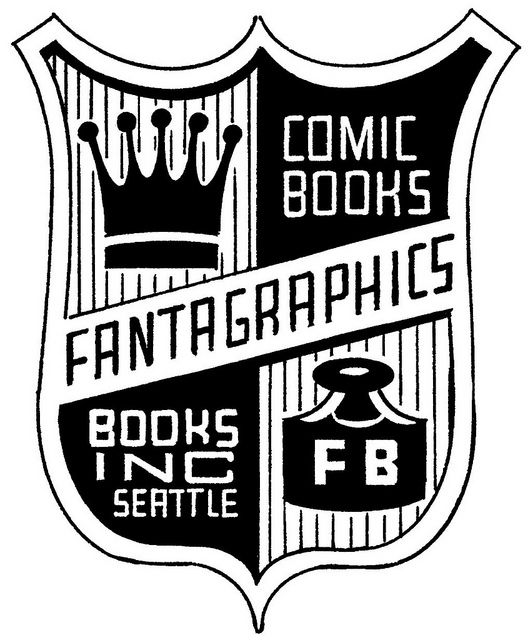The Open
God, I'm getting topical.
The Feature
Fantagraphics Books, the publishing beacon of alternative comics, must fund their “Spring 2014 Season” via Kickstarter, an effort publicized yesterday, resulting in an already sizable donation amount of (this writing) $64,489.
A number of Op/Eds will circulate and analyze the matter in the coming weeks (no doubt about it), published by the likes of comics-comics websites, official news outlets and fluid Twitter release, yet it’s unclear exactly how the event will be judged. Most cartoonists seem in support of the move (a support I won’t negate or disagree with), and one can only assume that the self-appointed comics financial sector will dig beneath all that math, informing us of “the industry” and why it’s dying.
But what’s interesting, I think, is the statement this makes on comics as a whole and the thin line this community/medium tip toes. I mean, consider it, Fantagraphics – THE publisher of alternatively ambitious comic books – needs a group hug. Without it, an entire “season” remains unmassed, and a few important cartoonists will watch their hard work collect dust, awaiting next “season” (although, someone should report this – what if ((and a highly doubted what if)) the Kickstarter goal isn’t met, what happens to these projects?).The occurrence and Gary Groth’s quotes in this CBR interview remind of the fragile structure supporting our medium, especially in terms of what the absence of a particular figure (Kim Thompson) may bring both an art form and business. To dress it up, it’s a sad realization that even giants possess bruisable ankles.
It’s easy to interpret yesterday’s news depressingly, though, so I’d prefer to see this as a charming turn of events, more so about the romantic thrill of cutting it close and taking charge than of unquestionable necessity and doom. Maybe something similar to that of Hunter Thompson’s “edge,” an invisible scratch mark left somewhere in the desert sand, and Fantagraphics, or any publisher for that matter, is the individual flirting with it, pushing boundaries in the face of absolute demise. Living within crisis.
Take this Groth quote from the Kickstarter page explaining the publisher’s internal debate as to whether involve an outside investor:
“We have throughout our history flirted with the idea of looking for an investor, but rejected it on principle: unless someone invested in us in the spirit of being a patron of the arts —highly unlikely— that way leads not only to madness but to the slow erosion of the core principles the company was founded on.”
Some may categorize this as a a shallow decision based only on stale, youthful rationale, but Groth’s statement is a stance for the sort of trajectory Fantagraphics holds genuine, and while it may endanger the very production of the art Groth and Co. want to release, it means more to them to flirt with risk than to sleep with security.
Something about that strikes me as very “comics,” riffing on the self-reliant backbone supporting the art where literally one cartoonist, a sheet of paper and a pen can create something. Independence lies at the heart of this thing, and Fantagraphics’s self-effort to capture funding channels such DIY-ability. They’re not waiting on a series of business meetings or particular clearance as for what to publish. Instead, they’re running with it, offering you your very own “Groth Voicemail” for $40, as to navigate the course they want. There’s no denying the intimacy of that. Or the excitement of participating in something so mortal, so ground floor.
Or so well organized. I mean, I, too, am sick of the Kickstarter thing. It’s long been maxed out, run dry by the likes of Tony Harris, but even so, this publisher did a solid job of presenting its case. Glance at Fantagraphics’s campaign, and it’s clear that this is more so about an impact than launching some cheap dream formed by a born-again script writer. Pairing a 39-tall stack of books with the company’s Clowes-drawn shield logo was enough to give the impression of the totality at hand, and the letter from Groth, a man I would never expect to pay Kickstarter any attention, spiked the whole affair with an eerie chill. The institution, and basically alternative comics, are on display now, and they’re asking for your support. Yesterday was a moment in which some of us – I know I did – stepped back and realized how much we love this culture and what we would feel if suddenly without it. It was a moment in which we realized how close we are, dangling along that edge.
There’s no doubt Fantagraphics will reach its goal of $150,000, probably even surpass it, but it’s important to still place this event in perspective – something the pundits will do in coming time. What’s truly important to note is that we’re witnessing an established publisher flaunt itself like some upstart operation. It’s bold, brash and even a tad embarrassing, but almost in some way, the company exudes a fresh energy from it. A crisis could leave much worse.
The Exit
"He never spoke of 'the industry' again."
Alec Berry went to sleep after publishing this. Follow him on Twitter @Alec_Berry


